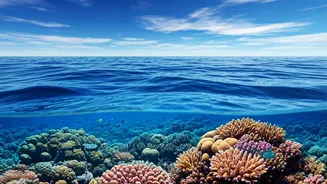Shared Ocean, Shared Destiny
Justice Surya Kant, the future Chief Justice of India, has urged India and Sri Lanka to enhance their cooperation to protect the Indian Ocean. He views
this collaboration not as an act of charity or diplomacy but as an essential measure for the survival of both nations. The Palk Bay and Gulf of Mannar, once vibrant hubs of biodiversity, now face significant threats from overfishing, damaging trawling practices, and a lack of regulation in coastal activities. These issues have led to confrontations between Indian and Sri Lankan fishers, representing a deeper ecological crisis driven by competition over diminishing resources. Justice Kant's vision involves pioneering a model of regional environmental constitutionalism, urging both nations to work together to safeguard their shared marine environment.
Ecological Vulnerabilities Exposed
The call for cooperation comes as Justice Kant pointed out several ecological vulnerabilities. He described the Indian Ocean as a historically significant connection, a bridge that has linked the people of India and Sri Lanka through culture, faith, and shared ecosystems. Beneath the surface of the Palk Strait, issues like oil spills, coral bleaching, and the livelihoods of fishing communities are under threat. He emphasized the necessity for India and Sri Lanka to set an example by protecting their marine ecosystems, with a focus on joint efforts to monitor and share data. This includes addressing the effects of climate change, such as saltwater intrusion, microplastic accumulation, and uncoordinated disaster responses, demonstrating a unified approach to these multifaceted challenges. The judge underscored the importance of robust regional institutions, highlighting that judicial pronouncements influence executive behavior, requiring environmental reporting, and often driving policy reform.
Judicial Dialogue Strengthened
Justice Kant addressed the historical context of these issues during his three-day visit to Sri Lanka, stressing the significance of the seas connecting the two nations, which have served as pathways for exchange of faith, culture, and ideas. He asserted that India and Sri Lanka must lead in establishing a model for regional environmental constitutionalism, advocating for joint initiatives to protect the marine ecosystem. A delegation of Sri Lankan Supreme Court judges is scheduled to visit India later this year or in early 2026, marking a step to enhance judicial dialogue and institutional collaboration between the two countries. The judiciary is portrayed as a critical guardian of ecological balance, with both nations having already developed strong environmental legal frameworks. This reflects a commitment to protecting the shared environmental heritage and addressing the challenges posed by climate change and unsustainable practices.














